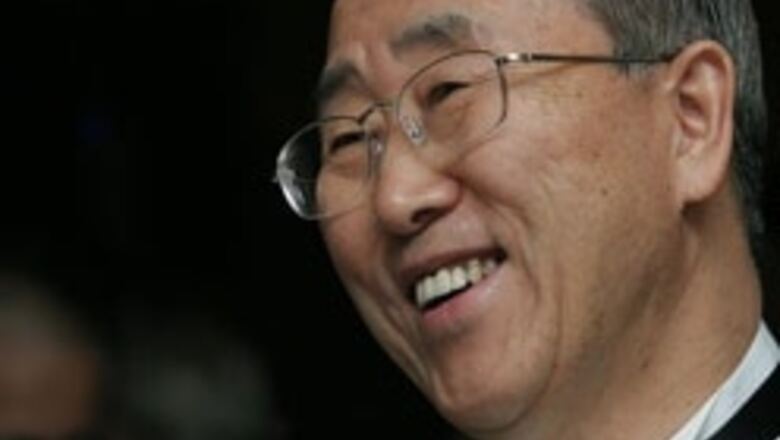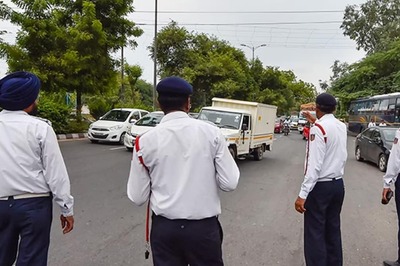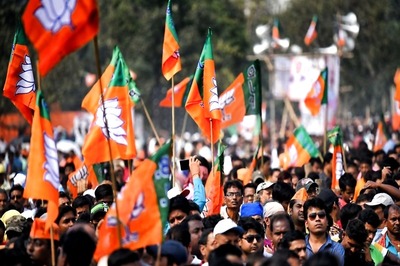
views
United Nations: The UN Secretary-General Ban Ki-moon has urged the United States and Britain to hold off on a push for tougher sanctions against Sudan, saying he needs more time to persuade the country to accept the deployment of UN peacekeepers in Darfur.
Ban said he hoped to send UN experts to Ethiopia's capital next week to follow up on an agreement he reached last week with Sudanese President Omar al-Bashir to work out UN support for a beleaguered African Union peacekeeping force.
"My position is that, before we talk about sanctions, let me have some more political space to deal with this dialogue" with the Sudanese government, Ban told reporters Monday after returning from a tour in the Middle East.
The United Nations and Sudan agreed in November on a plan for the incremental deployment of a joint AU-UN force of 20,000 peacekeepers.
However, al-Bashir has since backed off the deal, saying he only would allow a larger AU force with technical and logistical support from the United Nations.
At a meeting in Saudi Arabia last week, Ban and al-Bashir agreed to work on defining the size of the African Union force and the participation of the United Nations in the peacekeeping mission.
Ban did not win al-Bashir's acceptance of the deployment of UN troops.
Even so, Ban said the talks in Addis Ababa, Ethiopia, next week would focus on an initiative to send more than 3,000 UN troops, police and other personnel to Darfur — indicating the UN chief held out hope of persuading the Sudanese leader to change his stance.
The understaffed and underarmed AU force has been unable to stop the growing violence in Darfur, where more than 200,000 people have died in nearly four years of fighting.
The conflict is spilling over into Central African Republic and Chad, where hundreds of thousands of Darfur's 2.5 million homeless have fled.
The conflict began when members of the Darfur's ethnic African tribes rebelled against what they see as decades of neglect and discrimination by successive Arab-dominated governments in Khartoum.
PAGE_BREAK
Sudanese leaders are accused of unleashing the pro-government Arab militia, the janjaweed, which is blamed for widespread attacks and rapes against ethnic Africans.
On Sunday, gunmen killed five AU peacekeepers guarding a "water point" along the border between Darfur and Chad — the deadliest attack on the 7,000-member force since its deployment three years ago.
Ban deplored the attack and said it "really illustrates the necessity and urgency of dispatching hybrid peacekeepers to Darfur."
"That is what I am going to work on," he said.
On Monday, US State Department spokesman Sean McCormack said Washington was considering the "next diplomatic steps we might take because quite clearly to this point the diplomatic pressure that we, as well as others, have tried to apply — it hasn't been working."
Last month, the US government said it was preparing to impose new economic sanctions on Sudanese companies and block international sanctions involving US dollars. Secretary of State Condoleezza Rice said the United Nations also should consider tougher action against Sudan.
Last week, British Prime Minister Tony Blair called on the UN to consider imposing a no-fly zone over Darfur.
The measure apparently would be directed at stopping the Sudanese government's aerial bombardment of rebel positions, attacks the United Nations says have killed civilians.
Experts say the few economic sanctions imposed on Sudan by the United States and
European Union have had little effect.
The country has so far avoided harsh UN sanctions with help from China, a Sudan ally and veto-wielding member of the Security Council.
McCormack said Washington held out hope that Ban had privately received indications of flexibility during his talks with al-Bashir.
He said Washington's envoy to Sudan, Andrew Natsios, would ask for details on the talks during a meeting with Ban later Monday.
Ban said he felt the UN was making progress with the Sudanese government, citing an agreement reached last week to ease humanitarian access to Darfur's refugees.
He said he and AU chief executive Alpha Oumar Konare would meet at the United Nations on April 16-17 for an "extensive, in-depth consultation" on how to move forward in Darfur, based on the recommendations from the experts' meeting in Ethiopia.




















Comments
0 comment